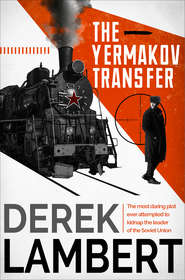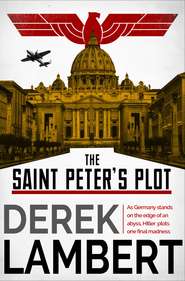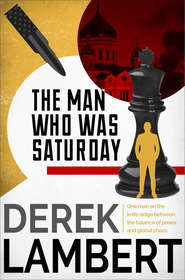По всем вопросам обращайтесь на: info@litportal.ru
(©) 2003-2024.
✖
I, Said the Spy
Автор
Год написания книги
2018
Настройки чтения
Размер шрифта
Высота строк
Поля
I (#ulink_b534727b-e708-563d-b481-a667e8a232e4)
Danzer didn’t look like a spy.
He was too sleek, too assured, too obtrusive.
But who does look like a spy? Anderson pondered as he sat shivering in the back of the battered yellow taxi, on loan from the New York Police Department, waiting for the Swiss financier to emerge from La Guardia Airport.
There was no future in looking like a bank robber if your profession was robbing banks!
For three days Anderson had kept Danzer under surveillance at the Bilderberg conference at Woodstock, Vermont, attended by more than eighty of the richest and most powerful men in the Western world.
Earlier that April morning in 1971, Bilderberg had broken up. Heads of state, politicians, bankers, industrialists, were now dispersing, confident that their deliberations had been secret.
Overconfident.
If Anderson’s calculations were correct, the conference had been attended by three spies. Certainly two – himself and the Englishman, George Prentice, one-time Professor of Economics at Oxford University.
Anderson was ninety per cent certain about Danzer. Well, eighty-five …. The Russians had been trying for seventeen years to penetrate Bilderberg. He had two reasons for believing that with Karl Danzer they had succeeded. Firstly, he was a new recruit to Bilderberg; and secondly, he was the only guest whose credentials didn’t quite pass intensive scrutiny.
Nothing specific, Anderson admitted, as the wind sweeping across the East River spattered sleet against the windshield of the taxi. Just a gap here, an inconsistency there.
Nothing that he could prove to his employers in their headquarters eight miles from downtown Washington D.C., where hunches were regarded with cynicism.
It was to convert a hunch into fact that Anderson had flown on ahead from Boston’s Logan airport to follow Danzer when he landed at La Guardia.
It’s got to be him, Anderson insisted to himself. Got to be, as the eighty-five per cent certainty wavered and fell five points.
‘Are you a hundred per cent sure he’s flying to La Guardia?’ the man sitting beside him asked.
Anderson who was sick of percentages said: ‘Sure I’m sure.’
‘Then he ought to be here by now.’
Anderson grunted. It always surprised and annoyed him when Miller broke into his thoughts. You forgot that Miller with his thin, greying hair, inconspicuous clothes and gum-chewing jaws was there. That was Miller’s strength.
Miller slipped a wafer of gum into his mouth without interrupting the rhythm of his jaws. In front of them, on the other side of a grimy transparent screen, sat the driver, bearded and wild-haired, staring into the sleet.
At regular intervals jets materialised from the cloud, as though suspended from somewhere above the low, grey ceiling; they seemed to hover for a moment, big and vulnerable, before disappearing onto the runway.
Anderson glanced at his wrist-watch. Miller was right: Danzer should have arrived by now. He assumed that the executive jet had been delayed by the weather. Whoever heard of a plane that was not delayed by some unexpected phenomenon?
‘Maybe he’s meeting someone inside,’ Miller said, nodding towards the arrival lounge. ‘Maybe he won’t be taking a cab,’ shifting the wad of gum from one side of his mouth to the other.
Anderson shook his head irritably. ‘He told me he was going to take a cab.’
‘Maybe he changed his mind. Maybe ….’ Miller said hesitantly – he was a nervous man and his nerves prodded him into making tactless remarks – ‘maybe you blew it’
‘How the hell would you know?’
‘Well, you are kind of conspicuous.’
‘I’m not the only black at La Guardia ….’
‘I didn’t mean that. But, you know, supposing he recognises you ….’
‘In this?’ Anderson gestured at the sleet; nevertheless he raised the collar of his raincoat so that it touched his tan, snap-brimmed hat, and slid lower in the seat.
‘I just hope you’re right,’ Miller said.
‘I am!’ Anderson leaned forward, rapped on the partition and pointed at the darkly handsome young man who had just joined the line-up for cabs. The driver, who already knew Danzer’s description, nodded his shaggy head.
Although it was 9.35 in the morning, Danzer stood blinking in the daylight as though he had just walked out of the night into a brightly-lit stadium. He was not alone in his reactions: all the other passengers waiting for cabs looked cowered by their meeting with the sleet, which was extinguishing springtime in New York.
‘Take a good look,’ Anderson said to Miller.
‘Don’t worry, I already got him.’
Anderson believed him: Miller’s eyes were camera lenses. And they had certainly photographed every detail of Danzer’s appearance. His wavy black hair, a little too long but not trendily so, the slim athlete’s frame, the cleft chin elevating what would otherwise have been ordinary good looks.
He wore a camel-hair coat slung casually over his shoulders, and beneath it the navy-blue mohair suit that he had worn at the conference. (In Anderson’s experience Russians who had managed to escape the attentions of Muscovite tailors favoured blue mohair.)
He carried a suitcase made of soft black leather, bearing in gold the initials KWD. The W, Anderson knew, stood for Werner. His black, buckled shoes were custom-made from crocodile skin. The only incongruous item was the shabby brown briefcase he carried in his left hand. Anderson noted that, although he pushed the suitcase along the ground with his foot as he neared the front of the line-up, he kept a tight hold on the briefcase.
Anderson said to Miller: ‘Don’t let that briefcase out of your sight.’
The driver of the police taxi, capable of speeds approaching 100 mph, started the engine as Danzer climbed into an equally battered cab, with an equally hirsute driver at the wheel.
The sleet continued to pour down as the two cabs, fifty yards between them, joined the expressway. Cabs and cars rode to Manhattan on wings of slush; they reminded Anderson of power-boats racing on a river, except that here on Long Island the race never ended.
The driver of Danzer’s cab was in a hurry, weaving in between the other vehicles whose drivers were too disgusted with the weather to brandish their fists or sound their horns. But, whatever Grand Prix ploys he pulled, Anderson’s driver kept behind him, theatrically nonchalant with one hand on the wheel, the other adjusting the wave-band on the portable radio stuck together with Scotch tape.
‘He’s too cool,’ Miller said. ‘He’ll lose him.’
‘It’ll be the first time,’ Anderson said.
Anderson knew that as soon as Miller took up the chase his nerves would stop jangling and he would be as cool as the driver.
Framed in the rear window of the cab Anderson could just make out the outline of Danzer’s head. He wondered what was going on in it. He hoped that it was filled with elation at his success in rubbing shoulders with the clique that unofficially moulded the lives of millions of men and women, most of whom had never heard of Bilderberg. He hoped that Danzer was anticipating promotion that had nothing to do with his outward trappings of success; elevation, that was, within the ranks of Soviet Intelligence. He also hoped that he was concentrating on the location where the drop was to be made.
But perhaps, Anderson brooded as the two vehicles crossed Triborough Bridge, he was merely deciding where to have lunch; anticipating, perhaps, a liaison with a beautiful girl. One aspect of Danzer’s character had been incontrovertibly established: he liked women; what’s more they liked him.
Danzer’s cab merged with the traffic pounding along the Franklin D. Roosevelt Drive. To his right Anderson caught glimpses of the dull-eyed buildings of Harlem, marvelling as he always did at the circumstances that had lifted him from a leaning tenement there to a small but luxurious apartment on the East Side.
Danzer’s cab took an exit to the right and burrowed into mid-town Manhattan. Here the sleet fell erratically, blown by the winds exploring the canyons between the high-rise blocks, and the streets were wet and clean while the slush piled up in the gutters.
‘What if he makes a meet?’ Miller asked, jaws quickening. ‘Who do I follow?’
‘Follow the briefcase,’ Anderson said.











